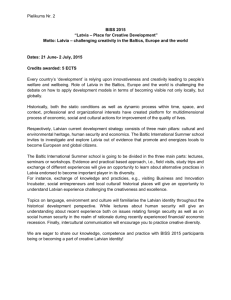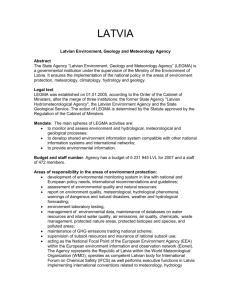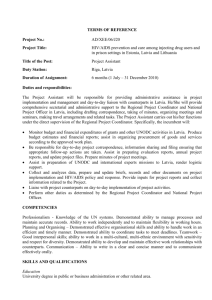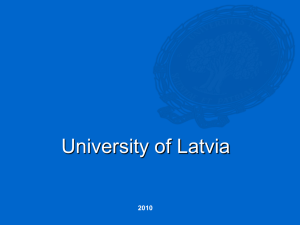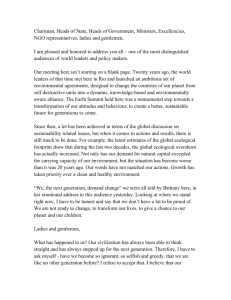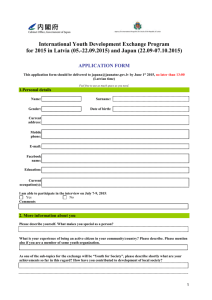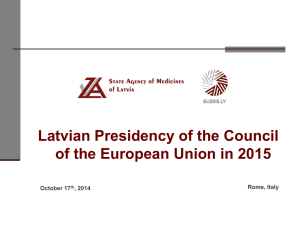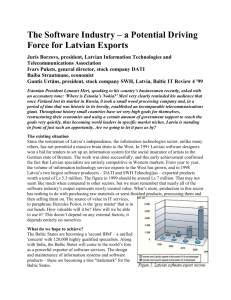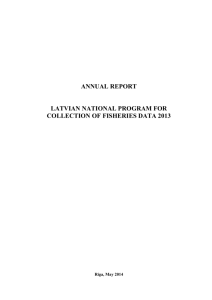Dr.sc.pol. TOMS ROSTOKS Curriculum vitae Education: 2000
advertisement
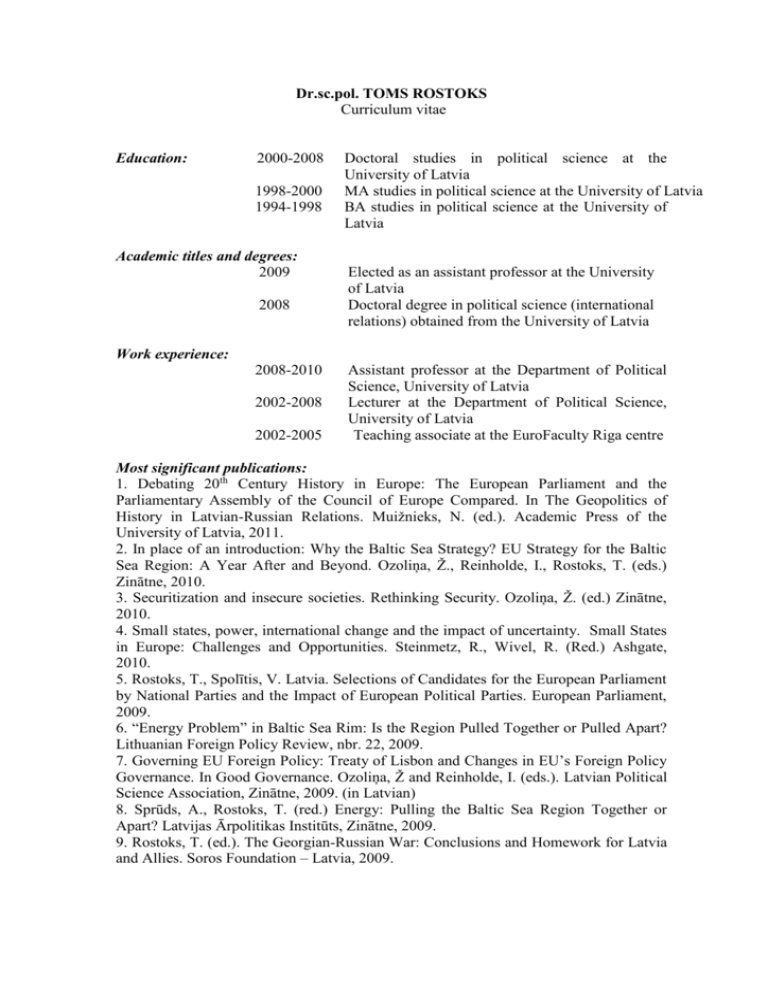
Dr.sc.pol. TOMS ROSTOKS Curriculum vitae Education: 2000-2008 1998-2000 1994-1998 Academic titles and degrees: 2009 2008 Doctoral studies in political science at the University of Latvia MA studies in political science at the University of Latvia BA studies in political science at the University of Latvia Elected as an assistant professor at the University of Latvia Doctoral degree in political science (international relations) obtained from the University of Latvia Work experience: 2008-2010 2002-2008 2002-2005 Assistant professor at the Department of Political Science, University of Latvia Lecturer at the Department of Political Science, University of Latvia Teaching associate at the EuroFaculty Riga centre Most significant publications: 1. Debating 20th Century History in Europe: The European Parliament and the Parliamentary Assembly of the Council of Europe Compared. In The Geopolitics of History in Latvian-Russian Relations. Muižnieks, N. (ed.). Academic Press of the University of Latvia, 2011. 2. In place of an introduction: Why the Baltic Sea Strategy? EU Strategy for the Baltic Sea Region: A Year After and Beyond. Ozoliņa, Ž., Reinholde, I., Rostoks, T. (eds.) Zinātne, 2010. 3. Securitization and insecure societies. Rethinking Security. Ozoliņa, Ž. (ed.) Zinātne, 2010. 4. Small states, power, international change and the impact of uncertainty. Small States in Europe: Challenges and Opportunities. Steinmetz, R., Wivel, R. (Red.) Ashgate, 2010. 5. Rostoks, T., Spolītis, V. Latvia. Selections of Candidates for the European Parliament by National Parties and the Impact of European Political Parties. European Parliament, 2009. 6. “Energy Problem” in Baltic Sea Rim: Is the Region Pulled Together or Pulled Apart? Lithuanian Foreign Policy Review, nbr. 22, 2009. 7. Governing EU Foreign Policy: Treaty of Lisbon and Changes in EU’s Foreign Policy Governance. In Good Governance. Ozoliņa, Ž and Reinholde, I. (eds.). Latvian Political Science Association, Zinātne, 2009. (in Latvian) 8. Sprūds, A., Rostoks, T. (red.) Energy: Pulling the Baltic Sea Region Together or Apart? Latvijas Ārpolitikas Institūts, Zinātne, 2009. 9. Rostoks, T. (ed.). The Georgian-Russian War: Conclusions and Homework for Latvia and Allies. Soros Foundation – Latvia, 2009. 10. European Parliament and the Baltic Sea region: From Northern Dimension to Baltic Sea strategy. In Role of the European Parliament in Implementing EU’s Common Foreign and Security Policy. Ozoliņa, Ž. (ed.). Zinātne, 2008. (in Latvian) 11. Relations between the Media and the State in Russia. Russia’s Media on Latvian Accession to the EU and NATO. Manufacturing Enemy Images? Russian Media Portrayal of Latvia. Muižnieks, N. (Red.). Academic Press of the University of Latvia, 2008. 12. United Nations and Development Cooperation: constraints and opportunities. In United Nations: Global answers to Global Questions. Reire, G. (ed.). Strategic Analysis Commission under the Auspices of the President of the Republic of Latvia, 6(17), 2007. (in Latvian). 13. Latvian-Russian Relations in 2020. In Latvia in 2020: Future Challenges for Society and State. Ozoliņa, Ž., Ulnicāne-Ozoliņa, I. (eds.). Academic Press of the University of Latvia, 2008. 14. Relations of the Baltic Sea States with Russia. In Enhanced European Union’s Eastern Neighbourhood Policy: Challenges and Questions. Lejiņš, A. (ed.). Latvian Institute of International Affairs, 2007. (in Latvian). 15. Latvian and EU Relations with Russia: the Differing Agendas. In Latvia-Russia-X. Ozoliņa, Ž. (ed.). Strategic Analysis Commission under the Auspices of the President of the Republic of Latvia, 2008. 16. Auers, D., Rostoks, T., Smits, K.V. Can Money Buy Happiness? Student Satisfaction in Latvian Higher Education. Baltic Economic Trends, Nr. 2, 2006. 17. Auers, D., Rostoks, T. un Smith, K. Flipping Burgers or Flipping Pages? Student Employment and Academic Attainment in Post-Soviet Latvia. Communist and PostCommunist Studies, Nr. 40, 2007. Research activities: 1. Researcher at the Latvian Institute of International Relations, 2007.-2009. 2. Researcher at the Advanced Social and Political Research Institute, 2005 and 20082010. 3. Global Development Network (World Bank) grant “Part-time Work or Part Time Study? The Impact of Working Students on the Quality of Higher Education in Latvia” in 2005 (together with Daunis Auers). Academic courses: 1. Foreign policy analysis. Part B, 6 ECTS. 2. Introduction to international politics. Part A, 6 ECTS. 4. Global agenda. Part B, 3 ECTS. 5. International relations theory seminar (MA level course). Part B, 6 ECTS. 6. Contemporary issues in international relations (MA level course). Part B, 6 ECTS. Toms Rostoks 02 February 2012.
